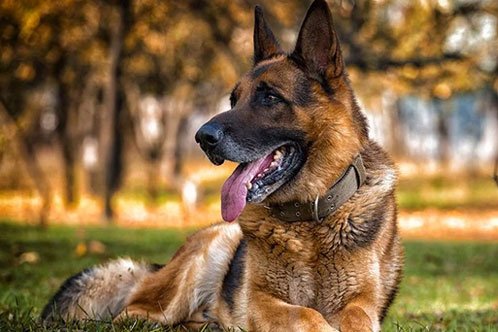Want to castrate your German shepherd but don’t know the right time? You must do it at the right age to not hurt your pet and cause health problems. Recent studies suggest that the healthiest age to neuter or spay your German shepherd is after they have reached maturity.
This age would be between 18 and 24 months of age because GSDs neutered before one year may be at higher risk for cruciate ligament tears. You should always seek out expert vets to do these procedures to care for your German shepherd.
Below you can learn a little more about this topic of spaying and neutering your German shepherd.
What Is Neutering Or Spaying?
Contents
Castration is surgical for a male dog, and it is where the testicles are extracted. This means that your German shepherd will no longer reproduce and will not have the necessary hormones for their growth.
Spaying is a form of surgical castration where the ovaries and fallopian tubes are removed from your dog. Which also means that he will not be able to reproduce. It means that sterilization removes a reproductive organ from your animal.
You must know that you must do it correctly and at the right age to avoid problems. With the appropriate information, you will make the best decision between the disorders due to neutering or sterilization: hip dysplasia, ruptures or tears of the cranial cruciate ligament, elbow dysplasia, cancer, tumors, etc.
The surgery can be performed open or laparoscopic. Open surgery is a very common and traditional surgical process. It means in the large incision so that the vet can see everything he is doing. In this process, the surgeon will cut the ligaments to remove the ovaries or uterus. Then the vet will close the interior for your pet’s recovery.
There is laparoscopic surgery, also known as minimally invasive surgery, because they don’t have to make large cuts. In this procedure, telescopic rods with a lens are used to see what is being done, the cuts are small, and the recovery is faster.
Why Neuter Or Spay A German Shepherd?

One reason for neutering or spaying is overcrowding, although there are other reasons. Overpopulation of pets is the main reason for euthanizing German Shepherds to avoid births and deal with puppies. The other reasons for performing these types of procedures are:
- Spaying, a German Shepherd, can prevent uterine infections and breast tumors.
- A spayed German shepherd will no longer need to attract males. This will prevent frequent howling and frequent urination actions.
- German Shepherds that are neutered will no longer need to go out looking for females.
- With castration, you can reduce the possibility of disorders of the testicles and prostate.
There are many reasons why a dog can be neutered; overcrowding in shelters is also a serious problem. More than 2.7 million animals are euthanized in shelters each year in the United States.
Best Time To Spay Or Neuter A GSD Dog
Many veterinary organizations do support the spaying and neutering of German Shepherds. But they always warn of the risks of this type of procedure. For this reason, they always advise German Shepherd owners what the recommended age for spaying or neutering is.
Depending on the age, you can reduce your German shepherd’s health problems. Because as mentioned above, there are many risks with this procedure, and many times, it is a problem.
German Shepherd Dogs that are neutered before the age of 1 year can cause knee problems. If you want to sterilize your German shepherd, you should first consult with your veterinarian, so you can study and learn all the most important aspects of the procedure.
How Old Must A German Shepherd Be To Spay?
The best age is after one year so that the German shepherd is sufficiently developed to avoid risks. Studies have shown that German Shepherds neutered before six months are more likely to suffer from joint problems.
You should be aware that your dog may have some behavioral problems after the procedure. You may notice that your male German shepherd may be more aggressive after neutering. But you cannot say a fair age for your German shepherd to be neutered or spayed. Some need a unique time depending on the type of GSD.
How To Recover From Neutering Or Spaying?

Whenever you do a spay or neuter procedure, you should think about proper recovery. Recovery will be similar to that of an injury, and you should avoid physical activities; your dog should rest to recover properly.
You can follow some tips for your German shepherd’s recovery from neutering or spaying. If you want to help your dog in his recovery, you can strictly follow the following tips:
- You should prepare a quiet place for your German shepherd to rest. In that time, you must leave it inside the house, and you must avoid interacting with other dogs to prevent physical activity.
- A German shepherd that has been neutered or spayed will need to go one month without physical activity. If your dog does exercise or physical activities in recovery, it can lead to complications in the procedure.
- You should monitor the opening of your German Shepherd dog after surgery. You should be aware of any swelling, bruising, or anything unusual that you may observe. If you notice an abnormality, you should contact your vet immediately.
- German Shepherds are active and unpredictable dogs, and you should prevent them from hurting themselves, so give them a collar or cone.
- You should know the right time to remove the cone from your German shepherd after spaying or neutering so as not to take away more freedom. Many experts say that the indicated time to leave the cone is 5 to 8 days or until the stitches are removed from your pet.
- If you notice that your dog has a decreased appetite, vomiting, or diarrhea, he may be experiencing complications from the procedure. If you notice any problems, remember to call your vet immediately.
If you follow these tips, you will be sure that your German shepherd will recover correctly and without complications. As you can see, this is a very sensitive issue that must be dealt with by experts to prevent your pet from having health problems.
If you decide to neuter or sterilize your German shepherd, you must consider all the health risks that can occur if the correct precautions such as age are not taken. But despite the problems and how difficult they can be, you will be helping your German shepherd in many ways.
With neutering or spaying, you will help your dog and improve his health and avoid overcrowding.




